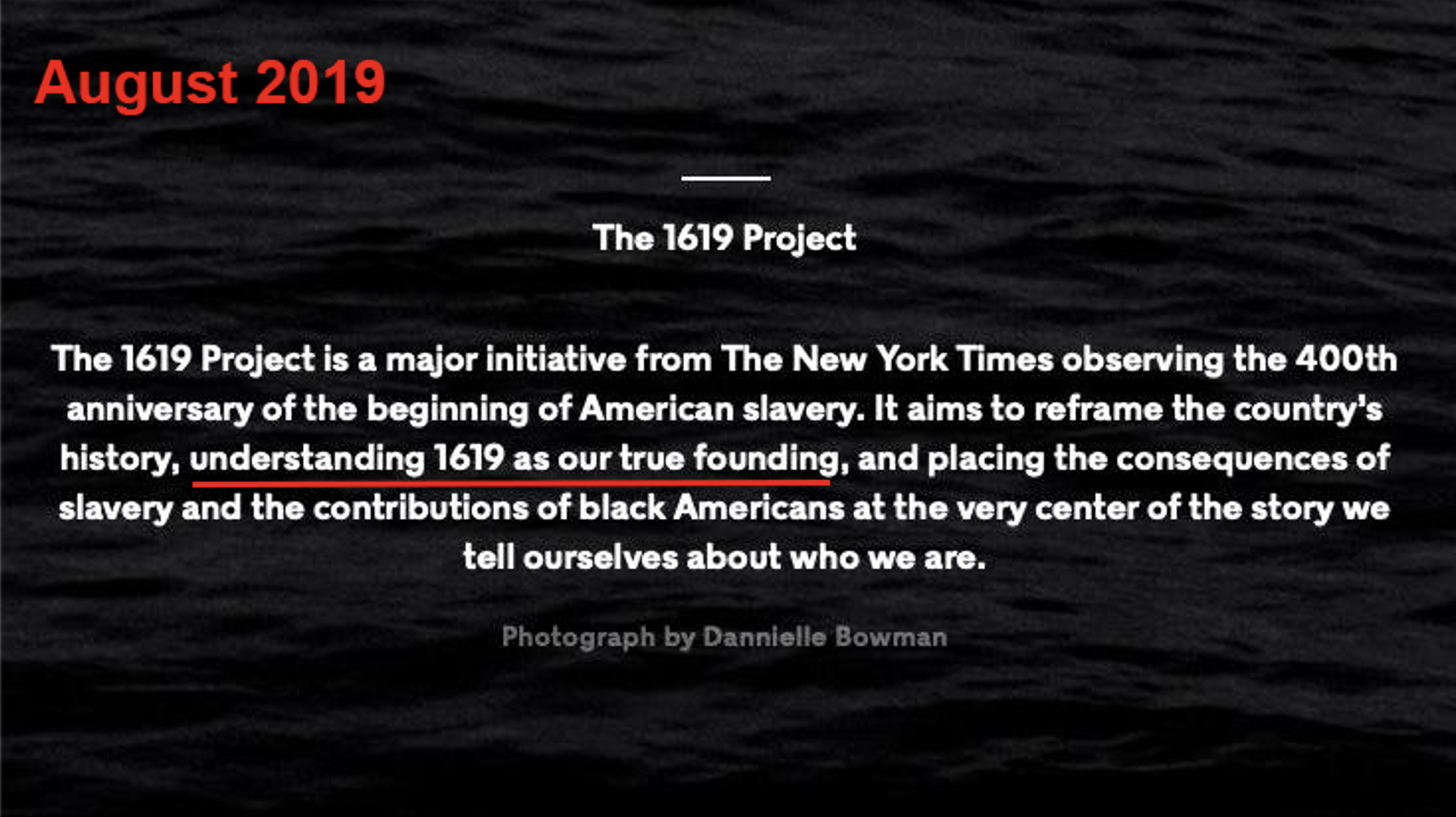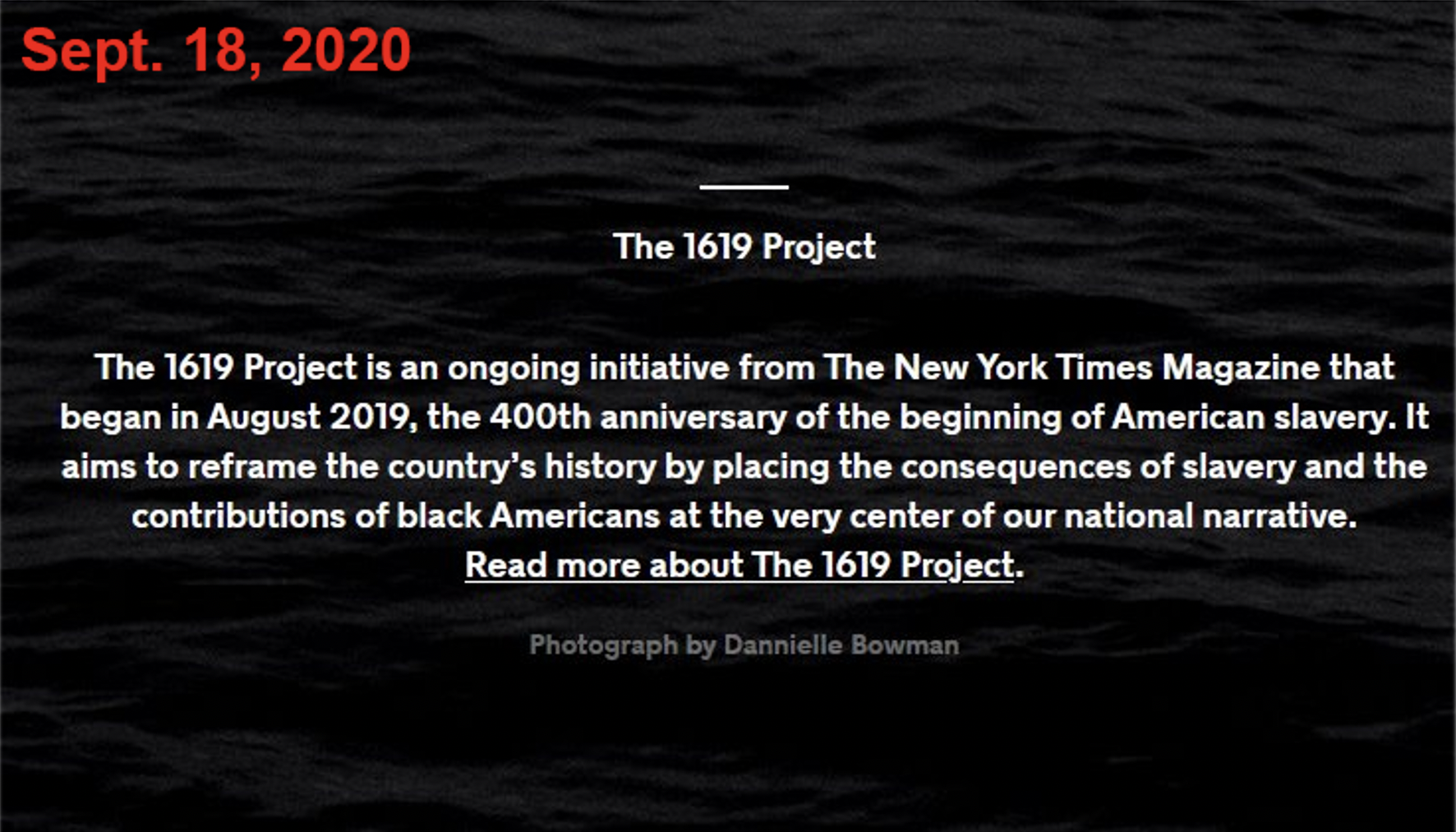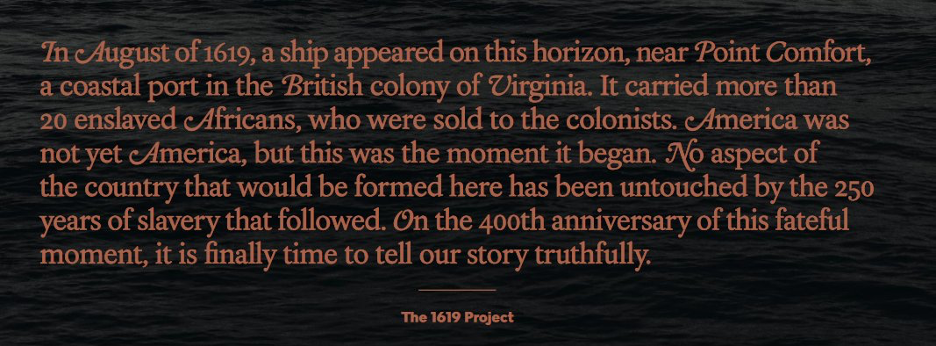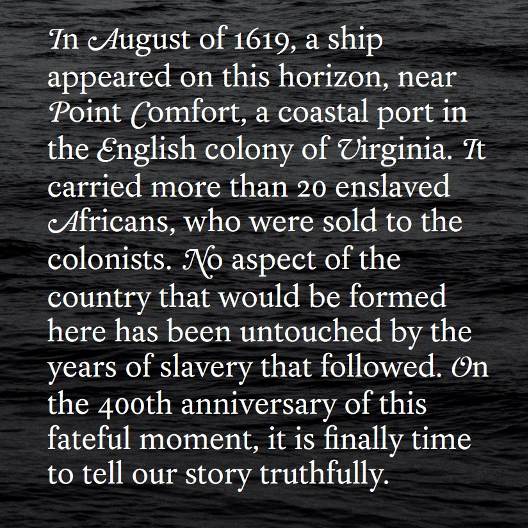History
Down the 1619 Project’s Memory Hole
The announced intention of reframing the country’s origin date struck many readers across the political spectrum as an implicit repudiation of the American revolution and its underlying principles.

The history of the American Revolution isn’t the only thing the New York Times is revising through its 1619 Project. The “paper of record” has also taken to quietly altering the published text of the project itself after one of its claims came under intense criticism.
When the 1619 Project went to print in August 2019 as a special edition of the New York Times Magazine, the newspaper put up an interactive version on its website. The original opening text stated:
The 1619 project is a major initiative from The New York Times observing the 400th anniversary of the beginning of American slavery. It aims to reframe the country’s history, understanding 1619 as our true founding, and placing the consequences of slavery and the contributions of black Americans at the very center of our national narrative. [emphasis added]

The passage, and in particular its description of the year 1619 as “our true founding,” quickly became a flashpoint for controversy around the project. Critics on both the Left and Right took issue with the paper’s declared intention of displacing 1776 with the alternative date—a point that was also emphasized in the magazine feature’s graphics, showing the date of American independence crossed out and replaced by the date of the first slave ship’s arrival in Jamestown, Virginia.
For several months after the 1619 Project first launched, its creator and organizer Nikole Hannah-Jones doubled down on the claim. “I argue that 1619 is our true founding,” she tweeted the week after the project launched. “Also, look at the banner pic in my profile”—a reference to the graphic of the date 1776 crossed out with a line. It’s a claim she repeated many times over.

But something changed as the historical controversies around the 1619 Project intensified in late 2019 and early 2020. A group of five distinguished historians took issue with Hannah-Jones’s lead essay, focusing on its historically unsupported claim that protecting slavery was a primary motive of the American revolutionaries when they broke away from Britain in 1776. Other details of the project soon came under scrutiny, revealing both errors of fact and dubious interpretations of evidence in other essays, such as Matthew Desmond’s 1619 Project piece attempting to connect American capitalism with slavery. Finally back in March, a historian who the Times recruited to fact-check Hannah-Jones’s essay revealed that she had warned the paper against publishing its claims about the motives of the American Revolution on account of their weak evidence. The 1619 Project’s editors ignored the advice.
Throughout the controversy, the line about the year 1619 being “our true founding” continued to haunt the Times. This criticism did not aim to denigrate the project’s titular date or the associated events in the history of slavery. Rather, the passage came to symbolize the Times’s blurring of historical analysis with editorial hyperbole. The announced intention of reframing the country’s origin date struck many readers across the political spectrum as an implicit repudiation of the American revolution and its underlying principles.
Rather than address this controversy directly, the Times—it now appears—decided to send it down the memory hole—the euphemized term for selectively editing inconvenient passages out of old newspaper reports in George Orwell’s dystopian novel 1984. Without announcement or correction, the newspaper quietly edited out the offending passage such that it now reads:
The 1619 Project is an ongoing initiative from The New York Times Magazine that began in August 2019, the 400th anniversary of the beginning of American slavery. It aims to reframe the country’s history by placing the consequences of slavery and the contributions of black Americans at the very center of our national narrative.

Discovery of this edit came about earlier this week when Nikole Hannah-Jones went on CNN to deny that she had ever sought to displace 1776 with a new founding date of 1619. She repeated the point in a now-deleted tweet: “The #1619Project does not argue that 1619 was our true founding. We know this nation marks its founding at 1776.” It was not the first time that Hannah-Jones had tried to alter her self-depiction of the project’s aims on account of the controversial line. She attempted a similar revision a few months ago during an online spat with conservative commentator Ben Shapiro.

But this time the brazen rewriting of her own arguments proved too much. Hannah-Jones’s readers scoured her own Twitter feed and public statements over the previous year, unearthing multiple instances where she had in fact announced an intention to displace 1776 with 1619.
The foremost piece of evidence against Hannah-Jones’s spin, of course, came from the opening passage of from the Times’s own website where it originally announced its aim “to reframe the country’s history” around the year “1619 as our true founding.” When readers returned to that website to cite the line however, they discovered to their surprise that it was no longer there.
The Times quietly dropped the offending passage at some point during the intervening year, although multiple screencaps of the original exist. The Internet Archive’s Wayback Machine suggests the alteration came around late December 2019, when the 1619 Project was facing an onslaught of criticism over this exact point from several distinguished historians of the American founding.
It wasn’t the only edit that the newspaper made to further conceal its previous denigration of 1776. Prompted by the discovery of the first deletion, Twitter users noticed another suspicious change to the project’s text. The print edition of the 1619 Project from August 2019 contained an introductory passage reading:
In August of 1619, a ship appeared on this horizon, near Point Comfort, a coastal port in the British colony of Virginia. It carried more than 20 enslaved Africans, who were sold to the colonists. America was not yet America, but this was the moment it began. No aspect of the country that would be formed here has been untouched by the 250 years of slavery that followed.

The website version of the 1619 Project now reads:
In August of 1619, a ship appeared on this horizon, near Point Comfort, a coastal port in the English colony of Virginia. It carried more than 20 enslaved Africans, who were sold to the colonists. No aspect of the country that would be formed here has been untouched by the years of slavery that followed.

This additional reference to the 1619 origin point, underlined in the original print version, is no more.
Whatever the exact occasion for the changes, the Times did not disclose its edits or how they obscured one of the most controversial claims in the entire 1619 Project. They simply made the problematic passages disappear, hoping that nobody would notice.






